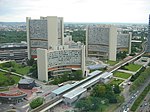United Nations Office on Drugs and Crime

The United Nations Office on Drugs and Crime (UNODC; French: Office des Nations unies contre la drogue et le crime) is a United Nations office that was established in 1997 as the Office for Drug Control and Crime Prevention by combining the United Nations International Drug Control Program (UNDCP) and the Crime Prevention and Criminal Justice Division in the United Nations Office at Vienna, adopting the current name in 2002. The agency's focus is the trafficking and abuse of illicit drugs, crime prevention and criminal justice, international terrorism, and political corruption. It is a member of the United Nations Development Group. In 2016–2017 it had an estimated biannual budget of US$700 million.
Excerpt from the Wikipedia article United Nations Office on Drugs and Crime (License: CC BY-SA 3.0, Authors, Images).United Nations Office on Drugs and Crime
Platz der Vereinten Nationen, Vienna KG Kaisermühlen (Donaustadt)
Geographical coordinates (GPS) Address Nearby Places Show on map
Geographical coordinates (GPS)
| Latitude | Longitude |
|---|---|
| N 48.233333333333 ° | E 16.416944444444 ° |
Address
Kaisermühlen - Vienna International Centre
Platz der Vereinten Nationen
1220 Vienna, KG Kaisermühlen (Donaustadt)
Austria
Open on Google Maps










